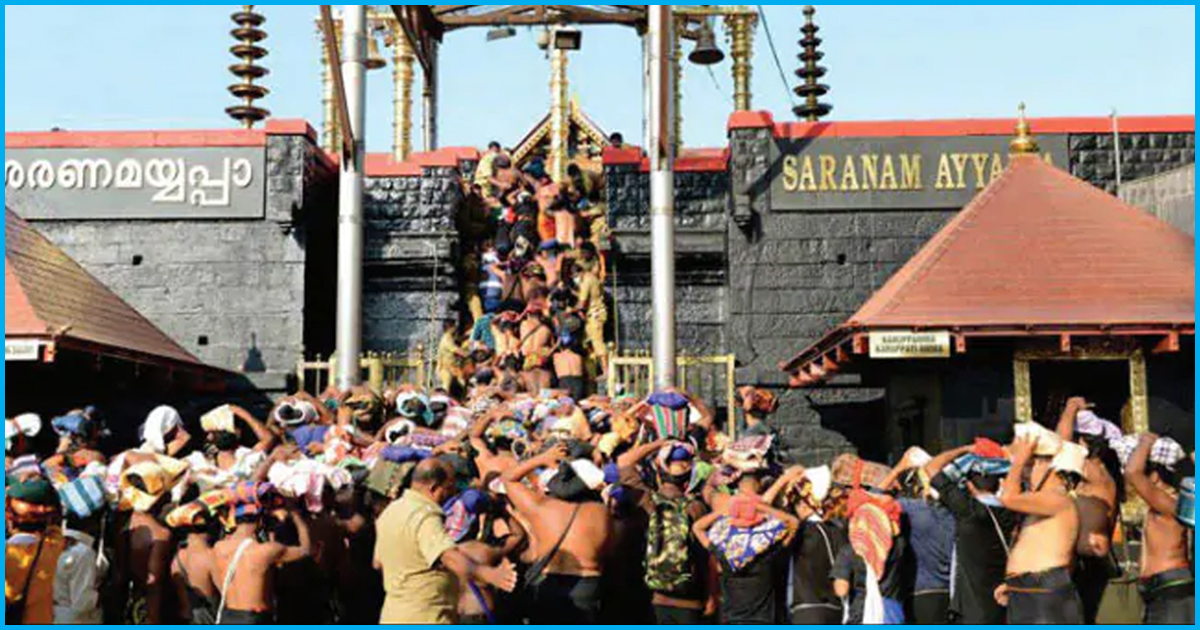
SC Allows Entry Of Women Of All Ages To Sabarimala Temple, Says Exclusionary Practices Violate Right To Worship
28 Sep 2018 10:33 AM GMT
In a major victory for Women’s rights, the custom of barring women aged between 10 years to 50 years from entering inside Sabarimala temple was declared unconstitutional by the Supreme Court. In a landmark decision, the Supreme court allowed entry of women of all ages in the Sabarimala temple. The Judgement was given by a five-judge bench of Supreme Court. There were four separate judgements in which the decision of allowing entry of women was given by 4:1. CJI Dipak Mishra and Justice A M Khanwilkar gave one judgement. Justice Rohinton Nariman and Justice D Y Chandrachud gave separate judgements and Justice Indu Malhotra wrote a separate dissenting judgement.
Chief Justice of India Dipak Mishra, while reading the judgement said that Law and Society are tasked with the responsibility of acting as equalizers and devotion cannot be subjected to discrimination. The Court said that banning entry of women in the shrine was gender discrimination and Patriarchal notion cannot be allowed to trump equality in devotion.
The court said that Religion is a way to link life with divinity and Sabarimala Temple practice violates the right of Hindu women to divinity. SC said that practice of exclusion cannot be regarded as essential religious practice, and this custom is not backed by Article 25 and 26 of the constitution, which are related to the right of freedom to practice any religion and religious practices.
In a separate judgement, Justice Chandrachud said that religion cannot be used as a cover to deny rights of worship to women and it is against human dignity. He noted that the prohibition of women is not due to religious reasons but due to non-religious reasons and it is a grim shadow of discrimination going on for centuries. He also said that any custom or religious practice if it violates the dignity of women due to physiology is not correct and the popular notion about morality can be offensive to the dignity of others.
In a dissenting judgement, Justice Indu Malhotra said that it was not for courts to decide which religious practices are to be struck down except in cases of social evils like Sati. Issues which have deep religious connotation should not be tinkered with to maintain secular atmosphere in the country. The head priest of Sabarimala Temple, Kandararu Rajeevarau said that he was disappointed but accepted the Supreme Court verdict on women entry.
Sabarimala is a Hindu pilgrimage centre located at the Periyar Tiger Reserve in the Western Ghat mountain ranges of Kerala and is one of the largest annual pilgrimages in the world, with an estimated over 100 million devotees visiting every year. Sabarimala is visited by Hindu pilgrimage, predominantly for men of all ages and can be identified easily, as they wear black or blue dress. Females, between the ages of approximately 10 and 50, are not allowed to enter the temple, since the story attributed to Ayyappa prohibits the entry of the women in the menstrual age group. This is because Ayyappan is a Bramhachari (celibate). Some cite the reason of hygiene as the tradition of Pilgrim dates back when there were less resource with women to keep hygiene during menstrual period.
The decision marks the end to the ban on women aged 10 to 50 years from entering the temple. The ban was formally introduced by the Kerala High Court in its 1991 judgement in ‘S. Mahendran v. Secretary, Travancore Devaswom Board’. The Court held that woman of age group 10 to 50 shall not be permitted to enter the temple “when they are not in a position to observe penance for 41 days due to physiological reasons.”
This judgement went seemingly unchallenged until 2006 when the petitioner ‘Indian Young Lawyer’s Association’ filed a writ petition challenging this along with Rule 3 of the Kerala Hindu Places of Public Worship (Authorisation of Entry) Rules, 1965 according to which if as per customs and usages, women at certain time are not being allowed to enter the place of worship then they shall be included in the class of people not entitled to offer worship.
The Logical Indian community welcomes the decision of the Supreme Court. It is important that with time, a society progresses and do away with rituals that don’t suit the time we are leaving in.
 All section
All section













